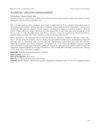 December 2023 in “International Journal of Science and Research (IJSR)”
December 2023 in “International Journal of Science and Research (IJSR)” Herbal treatments are effective and preferred for hair loss with fewer side effects.
 November 2023 in “International journal of biology, pharmacy and allied sciences”
November 2023 in “International journal of biology, pharmacy and allied sciences” Herbal treatments can help with hair problems, but more research is needed.

OCT can effectively screen and diagnose various medical conditions non-invasively.
 2 citations,
January 2015 in “Journal of cosmetology & trichology”
2 citations,
January 2015 in “Journal of cosmetology & trichology” Need better hair loss treatments beyond minoxidil, finasteride, and transplants.
The document concludes that current hair loss treatments have limitations and suggests researching new treatments targeting different factors of hair loss.
 11 citations,
December 2014 in “Clinical Obstetrics and Gynecology”
11 citations,
December 2014 in “Clinical Obstetrics and Gynecology” Obstetrician/gynecologists can diagnose and manage female hair loss with careful history taking and examination.
 April 2020 in “Food Research”
April 2020 in “Food Research” The document discusses various topics including the use of plant derivatives for hair loss, potential food additives, antioxidant properties of different extracts, and the study of bacteria on stainless steel surfaces.
 1 citations,
January 2022 in “Journal of Drug Delivery Science and Technology”
1 citations,
January 2022 in “Journal of Drug Delivery Science and Technology” A gel made with finasteride, garlic oil, and Aloe vera using nanotechnology can potentially treat hair loss more effectively.
10 citations,
November 2013 in “African Journal of Traditional Complementary and Alternative Medicines” Herbal oils from Cuscuta reflexa help with hair growth, dandruff, and hair fall.
 February 2025 in “Healthcare”
February 2025 in “Healthcare” Caffeine may help with hair loss, but more research is needed.
January 2025 in “Molecules” Caffeine may help with hair loss, but more research is needed to confirm its effectiveness.
 November 2023 in “Research journal of pharmacy and technology”
November 2023 in “Research journal of pharmacy and technology” Medicinal plants may effectively treat hair loss.
 October 2021 in “Cosmoderma”
October 2021 in “Cosmoderma” Hair loss can be managed with treatments like minoxidil, finasteride, and others, but there are still gaps in effectiveness and off-label usage is increasing.
 41 citations,
July 2015 in “Current Drug Discovery Technologies”
41 citations,
July 2015 in “Current Drug Discovery Technologies” Some plants may help with hair growth and have fewer side effects than synthetic drugs, but more research is needed to confirm their effectiveness.
 March 2024 in “Research Square (Research Square)”
March 2024 in “Research Square (Research Square)” Scalp cooling therapy helps preserve hair during chemotherapy for most patients.
 February 2024 in “Curēus”
February 2024 in “Curēus” Regional nerve blocks are better than ring blocks for pain relief during PRP hair treatment.
 73 citations,
March 2010 in “Food and Chemical Toxicology”
73 citations,
March 2010 in “Food and Chemical Toxicology” Zizyphus jujuba essential oil can promote hair growth.
 1 citations,
December 2016 in “Trichology and cosmetology:”
1 citations,
December 2016 in “Trichology and cosmetology:” Panax ginseng might help with hair growth and has fewer side effects than synthetic treatments.
 February 2024 in “International Journal For Multidisciplinary Research”
February 2024 in “International Journal For Multidisciplinary Research” The herbal hair oil with natural extracts can improve hair health and reduce dandruff.
 February 2023 in “International Journal of Pharmaceutics”
February 2023 in “International Journal of Pharmaceutics” A new version of minoxidil, a hair loss treatment, was made using nanotechnology. This version, called minoxidil cubosomes, works better and causes fewer skin reactions than the old version. It also penetrates and stays in the skin better, promoting hair regrowth. It's safe and could be a good alternative to current treatments.
 3 citations,
April 2023 in “Frontiers in Pharmacology”
3 citations,
April 2023 in “Frontiers in Pharmacology” ATP-sensitive K+ channel subunits, particularly Sur2A, play a significant role in various cancers.
 2 citations,
September 2020 in “Journal of Drug Delivery and Therapeutics”
2 citations,
September 2020 in “Journal of Drug Delivery and Therapeutics” Some plants can promote hair growth and are becoming more popular due to fewer side effects.
 1 citations,
February 2017 in “Journal of pharmacology & clinical research”
1 citations,
February 2017 in “Journal of pharmacology & clinical research” The herbal hair gel with Eclipta alba and Lippia nodiflora extracts was more effective at growing hair than the control gel and minoxidil.
December 2023 in “Pharmaceutics” The new adhesive nanoparticles are effective for delivering Minoxidil to the scalp without skin irritation.
4 citations,
October 2017 in “International Journal of Applied Pharmaceutics” Licorice extract hair tonics are effective and safe for hair growth, except for mild eye irritation at the lowest concentration.
 July 2024 in “Journal of Cosmetic Dermatology”
July 2024 in “Journal of Cosmetic Dermatology” Hydrophilic melanin may help hair grow by improving blood flow and regeneration.
 June 2024 in “Bangladesh Journal of Medicine”
June 2024 in “Bangladesh Journal of Medicine” Effective alopecia treatment depends on the specific cause and includes medications and procedures.
 December 2023 in “Journal of ayurveda and integrated medical sciences”
December 2023 in “Journal of ayurveda and integrated medical sciences” Ayurvedic treatment significantly improved hair loss in a 17-year-old male.
 182 citations,
October 2003 in “British Journal of Dermatology”
182 citations,
October 2003 in “British Journal of Dermatology” The 2003 guidelines suggest that while some treatments can regrow hair in alopecia areata, none alter the disease's progression, and wigs may be the best option for extensive hair loss.
 51 citations,
December 2011 in “The Journal of Dermatology”
51 citations,
December 2011 in “The Journal of Dermatology” New treatments for severe hair loss often fail, but some patients see hair regrowth with specific therapies, and treatment should be tailored to the individual's situation.

























